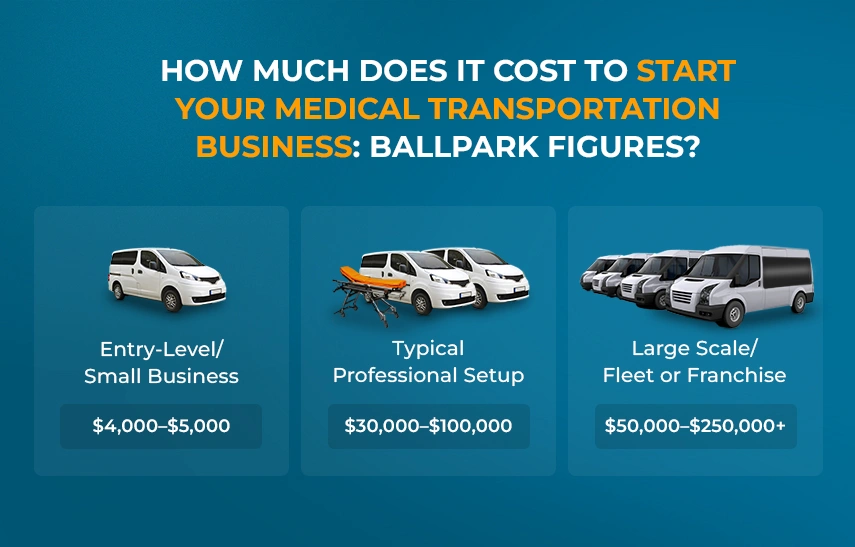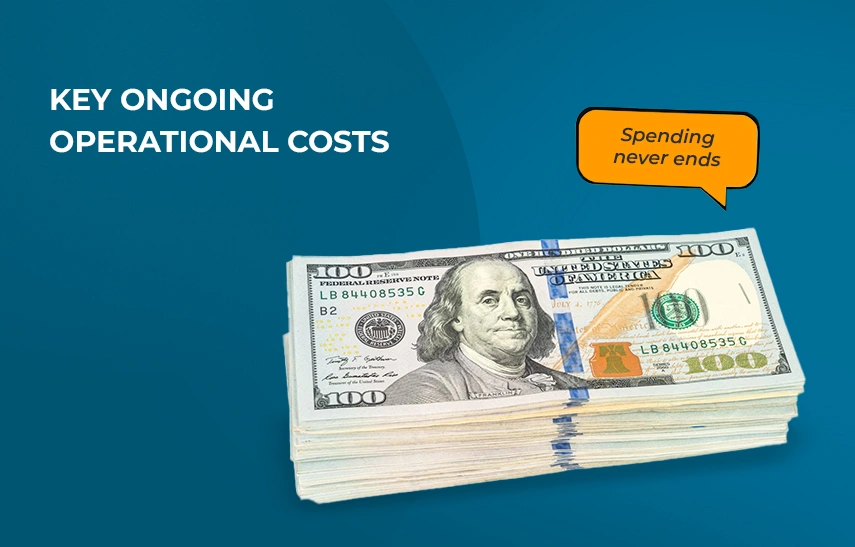How Much Does it Cost to Start an NEMT Business?

Starting your own NEMT business is an exciting idea, but it’s not one without its challenges. If you’re wondering how much money you can make, how much money you need to start your own NEMT business, and other business-related questions, we broke down some of your biggest questions here. This is by no means an all-encompassing guide to starting an NEMT business, but it will give you some insight into the process.
Contents:
- Why Is NEMT an Important Industry?
- How Much Does It Cost to Start Your Medical Transportation Business: Ballpark Figures?
- Detailed Breakdown of NEMT Startup Costs
- Key Ongoing Operational Costs
- Hit the Ground Running
Why Is NEMT an Important Industry?
Non-emergency medical transportation (NEMT) is a life-altering service available to senior citizens across the nation. Many Medicaid beneficiaries aren’t able to drive themselves, so they depend on NEMT services to safely get to and from their healthcare visits. Furthermore, rural communities and underserved urban areas face significant transportation barriers to healthcare access, creating sustained demand for NEMT services. There will be an estimated 70 million elderly citizens in America by 2030, which means the NEMT industry will only continue to grow. If you’re ready to get into this profitable business, here’s how you should start:
How Much Does It Cost to Start Your Medical Transportation Business: Ballpark Figures?
 The answer will vary based on your location, what type of trips you’re doing, and how many trip opportunities you’re landing. Someone who wants to purchase a fleet of brand-new vehicles will pay much more than someone who is going to use their personal vehicle for trips. Likewise, someone who wants to rent a building in their area will spend more than someone who plans to run their operation out of their home.
The answer will vary based on your location, what type of trips you’re doing, and how many trip opportunities you’re landing. Someone who wants to purchase a fleet of brand-new vehicles will pay much more than someone who is going to use their personal vehicle for trips. Likewise, someone who wants to rent a building in their area will spend more than someone who plans to run their operation out of their home.
Before we get into the specifics and detailed numbers, here is a short breakdown of expenses that you can expect depending on the scale of your future NEMT operation:
Entry-Level/Small Business: $4,000–$5,000 for a single vehicle with rentals or an owner's van for a limited, small-size operation. The no-frills strategy is acceptable for testing the market but will seldom provide full compliance and professional standards.
Typical Professional Setup: $30,000–$100,000 for a small, compliant, legal NEMT business. On average, you can expect to spend between $30,000 and $100,000 on start-up expenses such as vehicles, additional equipment, licenses, and insurance. This is the most typical range of investment that serious business owners can expect to spend.
Large Scale/Fleet or Franchise: $50,000–$250,000+ based on how many and what kind of vehicles and services are provided. Multi-vehicle operations need proportionally higher investment in equipment, insurance, and regulatory compliance.
Detailed Breakdown of NEMT Startup Costs
Now that you know that ballpark figure to start a non-emergency medical transportation business, let’s break it down by the category of expense and business ambitions.
Vehicle Acquisition and Modification
Vehicles represent by far the largest single investment for NEMT startups. We have a detailed guide to buying ADA-compliant vehicles for your fleet, but the basics are as follows:
Used van options: $16,000–$23,000 for a reliable used van in good condition suitable for transportation services. With these models you will be able to complete ambulatory or will have to do additional modifications for accessibility compliance.
New or Accessible NEMT Vehicles: $30,000–$100,000+ for brand new vehicles or previously equipped vehicles with accessibility features. Special-purpose medical transport vehicles are expensive but offer higher functionality and reliability.
Leasing: Leasing of equipment can minimize initial costs and give users access to newer, more efficient equipment. Leasing amounts per vehicle per month usually range from $400–$800, with varying specifications and lease term.
Cheapest Alternative: Using your personal vehicle to complete ambulatory contracts or modify it with a wheelchair ramp and other necessary equipment.
Additional Accessibility Equipment (if not pre-installed): $5,000–$15,000 per vehicle to properly convert a van and install additional equipment like wheelchair lifts, stretchers, and accessibility modifications. This equipment is utilized to support wheelchair patients and to be ADA compliant.
Licensing, Permits, and Regulatory Compliance
Legal compliance requires multiple licenses and permits:
Business Registration: $50–$500 for basic business formation, including LLC or corporation filing fees, depending on state requirements.
State and Local Licensing: $500–$3,000 for transportation-specific licenses. To run an NEMT business legally, you must get different licenses and permits depending on the state and county in which you operate, including: A business license to offer medical services. A transportation license to show that your vehicles are safe for patients.
Additional Requirements: States may require motor carrier operating authority, special endorsements for drivers, and regular safety inspections. Additionally, drivers might be required to have a chauffeur's license and extra endorsements for passengers. Also, in most cases employees handling patients must pass background checks and medical clearances.
Insurance Deposit
NEMT insurance is a substantial ongoing cost with substantial upfront investment.
Commercial Auto Insurance: Minimum Liability Coverage: $3,680–$5,000 annually per car. Comprehensive Policies: $5,000–$10,000 annually, based on coverage necessity and number of cars. Others quote even broader ranges, and premiums generally fall somewhere between $2,000 and $12,000 annually per vehicle, based on location, claim history, and coverage levels selected.
Insurance Deposits: Commercial insurance companies tend to demand substantial up-front deposits, often 2-6 months premium. For brand-new NEMT companies with no claims against them, deposits can be as little as $2,000–$6,000 per vehicle. The deposits are especially high for new companies since new entrants to the medical transport market are viewed as higher risks.
Other Types of Coverage: Professional liability, workers' compensation, and specialty coverages such as Sexual Abuse and Molestation (SAM) coverage increase cost to insurance but are worth the risk management.
Office Setup and Administrative Costs
Once again we are coming back to the decision, whether you want to run a citywide operation or cover a few routes with your own vehicle. This will determine the requirements for the business headquarters and the need for furniture, computers, printers, phones, internet access etc.
When starting small, modern technology allows you to run a nearly paperless fully digital enterprise from the convenience of your home. However, professional growth typically requires dedicated commercial space. Monthly rent and utilities vary dramatically by location, from $500–$2,000+ monthly for modest office space in most markets.
Working Capital Reserve
Nearly seventy percent of startups will eventually fail without delivering a positive return to the investors. One of the reasons behind this statistics is the lack of adequate cash reserves to ensure financial sustainability during the first rough years.
One-person operations need enough reserve funds to lead a fairly normal life without income, but larger NEMT businesses need at least $10,000 to cover operational costs before achieving profitability. This amount varies significantly based on operation size, local reimbursement schedules, and market conditions. As a rule of thumb, many successful operators maintain 3-6 months of operating expenses in reserve.
Key Ongoing Operational Costs
 Any beginner entrepreneur should understand that the initial startup budget is just the beginning. It is the recurring costs that are crucial to your long-term survival and represents the lion's share of your operating budget:
Any beginner entrepreneur should understand that the initial startup budget is just the beginning. It is the recurring costs that are crucial to your long-term survival and represents the lion's share of your operating budget:
Technology and NEMT Software: Aside from one-time setup, recurring expenses include software licenses, system maintenance, and technical support. The subscription fee for the most powerful scheduling and routeing software like RouteGenie will start from just $50 monthly. You will get GPS tracking, automatic billing, and many other features.
Fuel, Maintenance, and Repairs: $1,500-$3,000 monthly for each vehicle, depending on variable usage rates, vehicle age, fuel prices, and efficiency of the route. This also covers regular maintenance schedules, unplanned repairs, tire replacement, and increasing fuel prices that can contribute greatly to profitability.
Staffing, Recruitment, and Training: Payroll for 40-60% of operating expenses for an established NEMT provider is the typical cost. Driver salary is $28,500–$36,200 per year (about $17/hour), which increases in urban competitive marketplaces. Administrative personnel, dispatchers, and management typically receive similar compensation and therefore contribute equivalent costs. Recurring costs include background checks, medical certification, continuing education, and benefit packages.
Regulatory Renewal Charges: Vehicle inspections, driver certifications, and regulatory compliance charge an extra $1,000–$3,000 per year per vehicle. This does not include DOT inspections, business license renewals, or ongoing certification charges.
Marketing and Client Acquisition: Whereas startup marketing for a larger NEMT firm can cost $2,000–$5,000 for initial investment, recurrent customer acquisition via print/digital marketing, events, physician relationships, and web maintenance generally cost $500–$2,000 per month to sustain competitive visibility and build market share.
Hit the Ground Running
These are the basic startup costs and budget expenses to successfully start and run a non-emergency medical transportation business. But the numbers do not paint the entire picture. The hardest part of starting your own NEMT business is committing to the process. When you’re equipped with the knowledge you need to successfully kickstart your business, there’s nothing you can’t handle. So, if you’ve been thinking about starting an NEMT business, consider this your sign to start today.
About the author

As RouteGenie's Marketing Director, Yurii gained deep knowledge in the NEMT industry. He is an expert in marketing, leveraging all channels to build RouteGenie's brand and ensure NEMT providers have access to powerful NEMT software that can boost their growth. Yurii shares his knowledge by writing content on marketing and healthcare topics, including medical transportation, home care, and medical billing.